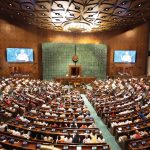Cambridge Analytica: The Foreign Hand
A proposal by the tainted Cambridge Analytica details how it can revive the Congress
 PR Ramesh and Ullekh NP
PR Ramesh and Ullekh NP
 PR Ramesh and Ullekh NP
|
29 Mar, 2018
PR Ramesh and Ullekh NP
|
29 Mar, 2018
/wp-content/uploads/2018/03/Rework-coverimage.jpg)
ON MARCH 27TH, Christopher Wylie dropped a bombshell. The former employee of Cambridge Analytica (CA) who blew the whistle on this UK-based firm that’s now in the eye of a storm over the harvesting of 50 million Facebook profiles to help politicians alter poll and survey outcomes told a parliamentary panel in London that India’s Congress party could be among CA’s clients. Wylie, a 28-year-old Canadian whose Twitter handle says ‘I make things with data’, was deposing before the House of Commons Digital, Culture, Media and Sport Committee. His statement comes amidst an escalating political row in India over data leaks and profile thefts to influence voter preferences. Congress leaders have dismissed what he said as a piece of fiction even as the ruling BJP has used it to sharpen its attack on Rahul Gandhi, the party president whose social-media engagement has risen dramatically in recent months.
Founded in 2013 by Strategic Communications Laboratories (SCL) Group, CA has been accused of using the Facebook data of individuals to influence elections as significant as the 2016 US presidential poll that saw Donald Trump emerge the winner and Britain’s Brexit referendum that went in favour of snapping away from the European Union. American security experts suspect that CA could have been the crucial link in Russia’s reported interference in the White House election.
In India, Wylie’s revelation of his former employer’s association with the Congress has put the party in a bad spot. As pointed out by Paul Farrelly, a Labour party member of the British parliamentary committee, the “opportunity for destabilisation” is extremely high in India, which is home to more than 11 per cent of Facebook’s active users worldwide. The country is the social media giant’s biggest market, even bigger than the US, and the subscriber count here has been rising at a faster clip than anywhere else. “They worked extensively in India,” Wylie told the panel, referring to CA, “They have an office in India … I believe their client was Congress, but I know that they have done all kinds of projects. I don’t remember a national project, but I know regionally… India’s so big that one state can be as big as Britain. But they do have offices there, they do have staff there.”
Congress spokesperson Randeep Surjewala maintains that the party “has had no truck with CA [and] never hired its services”. Congressmen also point at CA’s website to hit out at the JD-U, an NDA ally, which has been listed by CA as an associate. Referring to projects handled by its parent SCL, a statement on this website says: ‘CA was contracted to undertake an in-depth electorate analysis for the Bihar Assembly Election in 2010. The core challenge was to identify the floating/swing voters for each of the parties and to measure their levels electoral apathy, a result of the poor and unchanging condition of the state after 15 years of incumbent rule. In addition to the research phase, CA was tasked to organise the party base at the village level by creating a communication hierarchy to increase supporter motivation. Our client achieved a landslide victory, with over 90% of total seats targeted by CA being won.’ However, pundits aver that most such projects in the past didn’t involve large-scale tactics that could be considered cyber crimes. There was negligible if any theft, for example, of personal data from Facebook, whose penetration of the country was much lower back then and especially low in backward states like Bihar.
In the wake of Wylie’s disclosures, it is Rahul Gandhi who finds himself cornered, as a new document emerges to suggest that his party might have been in parleys with the disgraced British company to steer its campaign in upcoming state polls of Karnataka, Madhya Pradesh and Chhattisgarh, besides the General Election of 2019. Open is in possession of a detailed proposal prepared by CA that outlines what the firm could do to help revive the dwindling electoral fortunes of the Congress, which it says is confronted with an ‘existential dilemma’. When Open contacted CA’s office in London, an executive promised to respond to an email sent to it about its ‘proposal’ to the Congress, but has not yet done so despite having had sufficient time.
Having accused CA of gathering the details of 50 million Facebook users through foul means in 2014, Wylie had offered to provide the British panel with ‘documentation’ on the firm’s India-specific activities. Wylie also criticised his former employer for running campaigns in “struggling democracies”, which he termed “an example of what modern-day colonialism looks like”.
According to reports, CA executives were caught on camera boasting they (along with SCL) had worked on more than 200 elections around the world, including polls in Nigeria, Kenya, the Czech Republic and Argentina, apart from India. It is this scandal that forced Facebook’s founder Mark Zuckerberg to tender an unconditional public apology and carry full-page ads in multiple newspapers globally. ‘You may have heard about a quiz app built by a university researcher that leaked Facebook data of millions of people in 2014,’ Zuckerberg says in one, ‘This was a breach of trust, and I’m sorry we didn’t do more at the time. We’re now taking steps to ensure this doesn’t happen again.’ For Facebook, the CA revelations are turning out to be its toughest moment in 15 years of existence. But it is the fallout in India that has political observers agog.
The CA proposal to offer Congress operational and technological support for 2019, ‘constantly fed by research, informed by data science, and delivered through targeted digital marketing’
The proposal CA appears to have made to the Congress is ambitious. In the words of the aforesaid document, it is ‘designed to disrupt the BJP’s current monopoly on India’s ‘smartphone voters’ by building a world-class data and digital capacity for the INC in similar vein to what we did for the Trump campaign in 2016’. The papers also state that the firm’s help will prove critical ‘when the INC faces its first existential challenge at the 2019 Lok Sabha and competes with the incumbent BJP’. Once India’s dominant political party, the Congress was reduced to its lowest tally ever in the last General Election and has under 50 Lok Sabha seats now.
In a chapter titled ‘Executive Summary’, CA divides its proposal for the party into the following components: national situational analysis; a national data infrastructure project; a data-driven campaign for 2019 Lok Sabha; and state assembly elections. The first section outlines ‘CA’s plan to conduct a comprehensive review of INC’s existing communications activity and capability in order to build a clearer picture of the factors that will determine the success in the pan-Indian context’; for CA, this is also the ‘discovery’ phase aimed at extracting ‘maximum value from’ the party’s ‘existing data assets, third-party data’ and so on.
The second section on the national data infrastructure project delves into ‘how CA will apply its extensive experience to design and build an Operations Centre, equipped with a robust technical and data infrastructure that can facilitate coordinated team planning, strategy execution and seamless campaign communications to provide the INC with the ability to mount, powerful, efficient national campaigns’. A key aspect of CA’s proposal is the idea of an Operations Centre, which it claims played a pivotal role in Trump’s triumph in the US.
The third section offers what only companies with access to the personal preferences of people can offer. The data-driven campaign that CA envisages for the Congress will use ‘a combination of data analytics, behavioral science and targeted communications’. Behavioural science is a tricky field today in the context of poll or advertising campaigns following leaks of confidential information on individuals and considering the sine qua non for such exercises: the knowledge of individual choices as gleaned from their online behaviour. Putting such a data trove together invariably demands intrusion into the privacy of citizens.
The document notes that the rise of the BJP, which won in 2014, is both a cause and a consequence of congress’ demise and almost every poll shows the BJP is the clear favourite to win in 2019
Even in the past, the Congress party has come under attack for snooping on people. In the 1980s, long before the advent of the internet, Rajiv Gandhi brought in a bill that was to give the Government the power to sift the contents of letters sent through Indian Post. Thankfully, his bid was thwarted at the top level. President Zail Singh, with whom the Prime Minister had strained ties, simply sat on the bill without signing it, thus letting it lapse. But the regime’s intent, as evident from numerous cases of rival politicians’ phones being tapped, was inescapable: the unwarranted surveillance of citizens.
The fourth section of the CA proposal focuses on the forthcoming elections in Karnataka, Madhya Pradesh and Chhattisgarh. ‘All phases are intrinsically connected, ultimately leading to the 2019 Lok Sabha elections,’ says the CA document.
The papers also dwell at length on its cutting-edge data analytics to ‘model, segment and micro-target the population with personalized messaging’. Its strengths, CA contends, include ‘psychographic profiling of entire populations by acquiring and modeling ‘big data’’; finely targeted ‘tailored advertising and content to groups and individuals with unprecedented accuracy’; and research to ‘understand and influence the underlying motivations and drivers of human behaviour’. Its psychographic profiling involves the creation of profiles of voters based on online data, most of it private information.
In its introduction to the meticulously drafted proposal, CA talks about the vibrant nature of Indian democracy and the historical role in it of the Congress, before it highlights the party’s current predicament. ‘Winning 44 of a possible 545 seats in the lower house, it fell short of gaining opposition status and holds power in just five of the 36 Indian states and unions,’ it says, adding that ‘repeated charges of corruption, disunity, sycophancy and nepotism plague the party and calls for a change to the leadership and organizational structure persist’. The document notes that the ‘rise of the Hindu nationalist Bharatiya Janata Party (BJP), which won a historic landslide in 2014, is both a cause and a consequence of the INC’s demise. Narendra Modi’s populist narrative resonates strongly with millions of disenchanted Indians, and according to almost every poll, the BJP is the clear favourite to win again in 2019’.
It elaborates the strengths of the BJP’s digital campaign and then suggests that the Congress make radical changes to its ‘campaign methodology and infrastructure’ if it is to reverse the formidable political current running against it. A ‘business as usual’ approach or ‘even a substantial increase in campaign spend using the same traditional methods’, will simply not suffice, the proposal makes plain. The party needs ‘emphatic wins’ in the crucial states going to polls over the next year to boost its confidence and send out signals of change to the rest of India that would lend it the momentum it needs for 2019, CA reckons. For achieving those goals, CA prescribes, among other things, setting up a ‘highly targeted communications capability’.
The firm proposes to offer Congress operational and technological support for the 2019 polls equivalent to the data infrastructure that was at the heart of the Trump campaign, ‘constantly fed by research, informed by data science, and delivered through targeted digital marketing’. The proposal also aims to identify what it calls data gaps in the party’s campaigns. ‘The reality is that most governments or parties suffer from data ‘silos’, with data assets spread over multiple locations and systems, making it difficult to use the data effectively,’ the document says, emphasising that ‘CA’s behavioral and data scientists are experts in collecting, interpreting and using data to and develop a successful analytics-informed strategy’. Put simply, CA proposes to bridge the party’s gap between extant and required data inputs.
Under the plan, at the heart of the Operations Centre will be a central repository of information on the electorate and the party’s nationwide supporters. This, it says, would be a ‘digital framework capable of holding huge quantities of data, flexible in size and structure so that it can meet the INC’s needs long into the future’. This database ‘will be enriched with third-party data and constantly updated with new research results and behavioral insights, feeding the predictive models which enable us to design micro-targeted communications strategies’. The document also alludes to the advantage in terms of data that the ruling coalition would have, thanks to its having been in power for the past four years.
Referring to Karnataka, CA says ‘a smartphone battle using big data and social media was fought in UP, and it will be even more decisive in a state that is the technological capital of India’
The domestic headquarters of SCL/CA is in Ghaziabad, Uttar Pradesh, a short distance from Delhi, and the group has ten regional offices across the country. It maintains a database of over 600 districts and 700,000 villages, according to its website. By its claim, the list of its previous projects in India is long. Besides the 2010 Bihar assignment, the website mentions a caste census in 2012 done on behalf of a ‘national party’; a 2010 survey of castes by household in UP; a 2007 survey of politically active individuals of UP, also for a ‘national party’; a study the same year of jihadist trends in Kerala, West Bengal, Uttar Pradesh, Assam and other states; a 2003 study in Rajasthan for a ‘major state party’; and a set of psephological studies and behavioural polling in Delhi and Chhattisgarh. While the list suggests a wide client base, the heat is on Rahul Gandhi because apart from the JD-U and his party, the names of others who may have used the group’s services aren’t out yet.
Referring specifically to Karnataka, CA says that ‘a smartphone battle using big data and social media was fought in UP, and it will be even more decisive in a state that is the technological capital of India’. The firm wants the Congress to ‘regain the initiative by ensuring its campaign in fully data-driven and its communications digitally focused’. On Madhya Pradesh, which the BJP has dominated since 2003, CA thinks that the Congress has a ‘real chance’ in this year’s Assembly polls. The BJP currently holds 165 of the 230 seats in the state and the Congress, 56; CA wants the Congress to ‘conduct a thorough target audience analysis to better understand the grievances, attitudes and motivations of the electorate in MP and then plan and implement a campaign based on behavioral micro-targeting to mobilise the people of rural MP’. Similar is the strategy that CA offers for Chhattisgarh, which the BJP has been winning since 2003. The BJP won 49 of 90 seats in its Assembly the last time round, and the Congress, 39. ‘The INC must show that it can win emphatically in a 93% Hindu, BJP- controlled state in order to alter the attitudes of voters in the run-up to the Lok Sabha [polls] just a few months later,’ the proposal states.
Contacted by Open, Divya Spandana, head of the Congress social media and digital communications team, says, “[CA] could have made a proposal, but they never sent it to us. I’ve never met nor spoken to anybody. Neither has my boss.”
In its role as a political consultancy, the company extols the virtues of the so-called four Vs of Big Data in its proposal: Volume, Variety, Velocity and Veracity. By setting up large-scale digital infrastructure, CA argues, the INC ‘will have a web-based data reservoir that can be updated and accessed at any time to help plan strategy, direct local campaigning, and plan interactions with supporters’. It has also offered an internal layout plan for an Operations Centre. Throughout the proposal, CA places emphasis on the party’s need to ‘map the drivers and dynamics of popular sentiment’. Persuasive messages individualised for enhanced appeal is a crucial component of the plan.
As for research on voter behaviour, CA recommends starting off with face-to-face or online tools, apart from telephone interviews. ‘CA will conduct a series of focus groups to ensure accurate representation across age, gender, income/education, geographic location and political partisanship,’ the document promises; ‘The result of this phase will be a detailed assessment of the key dimensions that are likely to influence support of the INC across India, the real impact of the candidates, and ideas/expectations for the future.’ Surveys by CA are expected to provide the data needed to divide the population into distinct groups based on shared characteristics, views and motivators, the document states. The idea of this approach is to gauge the relative importance of local and national issues, support levels for candidates, voter perceptions, and key influencers among assorted population segments. According to the proposal, ‘CA’s data scientists will transform data into insight by analysing and visualising the cleaned and enriched data to identify patters and build and understanding of influencing factors.’
In sum, the company would prepare a complete data set on the Indian electorate, and all the information required to develop a strategic communications plan for engaging voters, tailored to the issues and concerns of each target audience. The principal aim, the document reiterates, is to enable the Congress to get the appropriate message across to voters in the most effective way.
The overall plan, in CA’s view, would be to replicate for the Congress the strategies that won Trump the White House. That the US president’s former aide Steve Bannon once served as a vice- president of CA lends credence to its claim of credit for that victory. The document says that for the US election, the firm polled 180,000 individuals across 17 battleground states, online and by telephone: ‘This information allowed us to speak to voters in a way they would understand and respond strongly to.’ The firm promises to apply data science to not only predict how voters think and behave ‘so that you [the Congress] can target the right people and convert them to supporters’, it hopes to identify those who are likely to vote for the party across villages. CA also proposes to put in place a digital platform to analyse feedback from party workers at the grassroots.
Hiring a data analytics company is par for the course in any modern election anywhere in the world, and India is no exception. The current ruling party, for example, had employed young data scientists and others to its advantage in 2014. What has drawn CA under a cloud is its use of unethical means that has come to light. While this has had its repercussions, the details of its proposal do suggest hard work having gone into it.
More than once in the document, CA refers to the Congress’ ‘existential challenge’ and the need for leadership change. The challenge, as they say, is to change the system more than it changes you.

/wp-content/uploads/2024/12/Cover_Double-Issue-Spl.jpg)













More Columns
The Music of Our Lives Kaveree Bamzai
Love and Longing Nandini Nair
An assault in Parliament Rajeev Deshpande